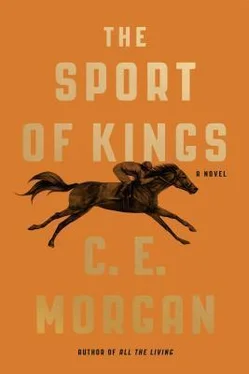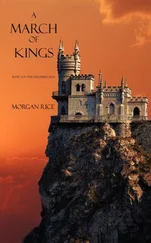He wanted to think about It, but he was so tired and the aspirin was working, and his mind kept slewing free, then knocking to rights again with a jolt, and always his mother was there, gazing on him with eyes as deep and dark as mouths. He drifted and sensed her gentle touch on the lines and curves of his face — the ridge brow that would soon emerge from its soft recess, the jaw that would widen like his father’s under fine cheekbones, a proud nose, all markers of those men residing in him, forming rings in his bones, rings in the family tree: John Henry by Jacob Ellison Forge out of Emmylade Sturgiss, and Jacob by Moses Cooper Forge out of Florence Elizabeth Hardin, and Moses by William Iver Forge out of Clara Hix Southers, and William by Richmond Cooper Forge out of Florence Beatrice Todd, and Richmond by Edward Cooper Forge out of Lessandra Dear Dixon, and Edward by Samuel Henry Forge out of Susanna Lewellyn Mason, and it was Samuel Forge who had come through the Gap in the old time in the old language:
He was raised up on the graded slopes of Virginia, where the Forge clan had resided a hundred years on a piedmont tobacco farm, far east of the mysterious, canopied wildernesses. But the Old Dominion was too small, too tame for a man like Samuel Forge, and Virginia was fighting for a freedom already hemmed and hedgerowed, so he thought his hands empty despite his wealth, and his restless eye turned to the wooded West. He set out for that expanse, leaving behind for now the woman who had borne his son, Edward, taking with him only a Narragansett Pacer he had raised from a colt and a bondsman he had bought for $350 on Richmond’s Wall Street, younger than himself but stronger, fine-speaking, and useful. The black rode a stock roan with feathering over its thick draft pasterns and followed behind, his flintlock rifle strapped along his leftside flap. They crossed the bucolic piedmont, heading west along well-worn roads, over the first blue ridges that wrinkled and buckled up from the rocky flats, until the wide roads narrowed and sparsed to a trace like a roughspun thread through the wilds. The cultivated world of Virginia dimmed to a hum, then fell silent, replaced by the ungoverned noise of hardwood forest. Beyond those first beckoning ridges with their white mist over black deciduous interiors was the promise of infinite land. Forge and his slave both settled into their saddles and checked their rifles. Beyond the last fort they encountered a few starveacre farms with straggling corn patches and children outfitted in woolen rags like worn poppets with yarn hair, unschooled heads atop churchless bodies. A half day beyond these, they encountered a pack of dogs run off from slaughtered families in distant cabins, the dogs now roaming the trace as the bison once had, shaggy and grinning. An acrid sliver of cooking smoke here or there. The sound of chopping wood far beyond the steep escarpments of trees and rocky soil. One day they rode beneath a parrot escaped from its filigreed past, perched now on a chestnut limb, counting one, two, three. Then nothing, nothing but an ever-narrowing passageway through interminable wilderness. They rode on, the black behind the white, neither speaking. The road grew rough as it went sidewinding up the ridges of rock, wet with lichen and moss, and down into notches narrow and dank as graves, the wood and many generations of leaves rotting there as midden. They rode on. Upon besting the highest ridges, the great dissected plateau extended before them, long ridges baring strata of the earth, endless green and blue and gray under the augmenting sky. When the valleys sometimes widened for rills and rivers, the land blossomed bright in sunlight and thronged with birds. There the men would rest and water the horses and then ford the rivers, the last ferry having been many waterways ago.
They took to sleeping on opposite sides of the same tree, their backs to the bark, half-awake even in their deepest slumber. The slave spared one eye for Cherokee and Forge an eye for Shawnee. And every morning they resumed their westward trek, sometimes leading the horses along by their bridles, sometimes mounted and poured flat over the saddles to evade the low raftery of trees. They climbed and weaved and scrambled and hacked, their senses alert for natives. When they had struggled their way through the worst of the trace and were within hope of the valley called Powell’s, a man without a horse came staggering out of a crook in the path, and they stood their own horses in amazement as the man took no notice of them at all, but walked past with a torn burlap satchel and a dressing knife, staring straight ahead with wild eyes and murmuring child’s talk as he went. Forge tightened the grip on his rifle and spurred on, but the bondsman turned and watched until the man was out of sight, and a long time after.
They came to the Gap in the afternoon, easily traversing the six level miles before it and watching the vast pinnacle loom to their right, the shallower ridge to the left and the low curtsy between. They found a stream and a cave in that open land, and they passed as quickly as possible, and though they did not see any natives, the natives saw them. They rode through the saddle passage and into the hot and humid hills that redoubled their pleating on the far side, so the trail rose and fell with maddening redundancy with no reprieve for days, and their fear was like pain. A horse was snakebit while foraging, and they bled the horse and waited three long days until he finally took the bit again. Then they continued and the next day found a scalped dog in a field of fiddle ferns, a hound. They buried it beneath a sepulchre of geodes and for another week saw no other signs of travelers, only bear, wolf, fox, and rabbit, and at night heard the womanly cries of wildcats.
Finally the land eased, calmed, and they walked in expansive sunlight through a glade. Approaching the crest of one of the last great hills, Forge stopped and gazed back over the fraught land they’d traveled, where in a year’s time he would bring his belongings, his will the windlass by which all the packhorses and the children and the slaves and the mules would be hauled across the mountains. On this last big hill, Forge finally spied the knobs that announced the end of the mountains, and they made for them.
Beyond the knobs, they discovered a transylvanic broadening of the land, where it rolled out its high shale hills and sloped to a distant river they could not see but expected. Forge stopped on this high meadow and reached down, scraping the soil with his finger, his heart stalling at the thin yellow soil reminiscent of clay. His slave said nothing; there was still a ways to go before they reached their destination. Forge remounted and slipped his feet into the irons that had borne him across two hundred miles of agony, and shortly they arrived at the river that snaked three hundred feet below its upper limestone cliffs. They wondered at the sheer drop and then clambered down the palisades, the horses shying and sinking into their quarters as the trail sank, the day and the heat fading. They passed the exposed musculature of the plateau’s rockbed, loose limestone shedding where cleft plates had formed the canyon; the horses stumbled on these shed innards as they walked the barely hewn path, blowing air and straining. At the cool base of the canyon, they swam the green river and remounted the ramparts on the far side. When they finally regained the summer day far above the river, they had passed the last great impediment west of the mountains, and their destination was closing. They were in Lexington by nightfall of the next day.
But there was a bustling at this outpost and cabins with yards neatly set, and women walked there in chattering pairs on land already parceled and named, so spurred by dissatisfaction, Forge set out northeastward, and they rode quickly on the level forest with its occasional meadows of clover. They saw no one, though they followed a faint path broken largely by hooves. Soon, the underbrush grew denser all around until they dismounted and were forced to reblaze the trail.
Читать дальше
Конец ознакомительного отрывка
Купить книгу












